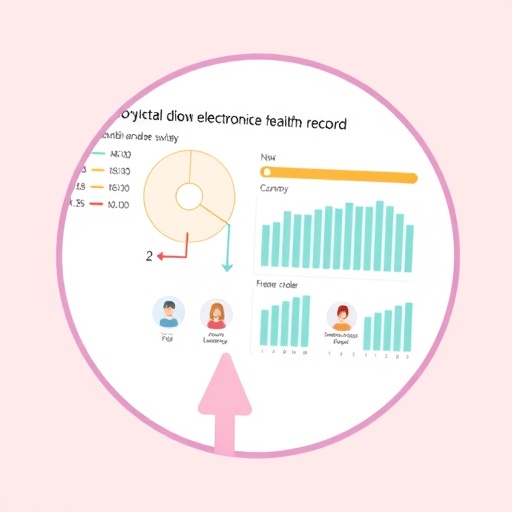A groundbreaking study conducted by researchers at Fox Chase Cancer Center, unveiled at the prestigious American Society of Clinical Oncology’s (ASCO) Annual Meeting, introduces a transformative approach to the integration of fertility preservation counseling within oncology care. This innovation is centered on the implementation of a Best Practice Advisory (BPA) embedded in the electronic medical record (EMR) system. The BPA acts as a strategic prompt that facilitates timely and effective communication between healthcare providers and young adult cancer patients regarding the impact of cancer treatments on fertility and family planning options.
Over the past decade, the incidence of cancer among adults aged 18 to 49 has seen a noticeable increase, highlighting a pressing need to address the unique challenges faced by this demographic. Unlike other age groups, young adult cancer patients confront not only the immediate threat of their diagnosis but also the long-term implications of treatment on reproductive health. The incorporation of an EMR-based BPA directly addresses the gap in clinical practice where crucial discussions on fertility frequently remain overlooked during the flurry of initial cancer diagnosis and treatment planning visits.
Dr. Christopher Cann, Director of the Young Adult Cancer Program and Assistant Professor in the Department of Hematology/Oncology at Fox Chase, spearheaded the research. He articulates the significance of fertility preservation as a quality-of-life imperative rather than a mere medical footnote. “Fertility preservation isn’t just a medical issue, it’s a quality-of-life issue. And yet, these conversations often never happen,” Cann explained, underscoring the motivation behind the integration of the BPA within clinical workflows.
Before the integration of the BPA, data revealed a stark discrepancy between patient concerns and provider engagement. Up to 75% of young adult cancer survivors express anxiety about their future fertility, but merely 28% reported receiving adequate information about fertility risks linked to cancer treatments such as chemotherapy and immunotherapy. This discrepancy evidences a critical unmet need for systematic intervention to ensure informed patient decision-making.
Implemented in July 2024 at Fox Chase, the BPA functions by triggering an alert in the EMR when a healthcare provider initiates chemotherapy or immunotherapy orders for patients between 18 and 50 years old. The alert queries the provider with the question, “Would you like to refer this patient to the oncofertility team?” This seamless integration not only reminds clinicians to address fertility but also streamlines the referral process by enabling direct communication with fertility preservation specialists through the EMR interface.
The referral mechanism embedded in the BPA offers providers practical choices to manage alert responses, such as indicating “medically inappropriate” or “patient declined,” ensuring that notifications are contextually relevant and reduce alert fatigue. If a referral is placed, the dedicated oncofertility team, consisting of specialized nurses and social workers trained in fertility counseling, proactively reaches out to the patient within 48 hours. Their role encompasses discussing fertility preservation methodologies, addressing costs, and assisting in scheduling appointments with local fertility clinics equipped to perform procedures like sperm banking and egg cryopreservation.
Preliminary outcome data within six months of BPA implementation at Fox Chase reveal a dramatic 450% increase in oncology referrals to oncofertility services compared to the cumulative average of the prior twelve years. This surge demonstrates not only the efficacy of EMR-integrated interventions but also the unmet demand for fertility counseling previously hindered by systemic barriers in clinical practice.
Furthermore, the measurable impact on fertility preservation is striking. Fourteen patients underwent successful fertility preservation—including sperm banking and egg cryopreservation—within six months post-BPA introduction, a number approaching the total for the preceding five years combined. These findings underscore the vital role of timely counseling and access to fertility preservation resources for reproductive-age cancer patients facing gonadotoxic therapies.
One of the principal challenges addressed by the BPA is the limited time clinicians have during initial consultations, which are typically dense with diagnosis disclosure, treatment planning, and prognostic discussions. The BPA acts as an embedded cognitive aid, ensuring fertility preservation is systematically considered without imposing additional cognitive burden on providers. Dr. Cann emphasized, “The BPA integrates that reminder into the clinical workflow and makes referrals easier,” highlighting the importance of technological solutions in improving comprehensive patient care.
Beyond Fox Chase, the researchers advocate for widespread adoption of similar EMR-based interventions across oncology centers globally. Given its scalable nature, the BPA model offers a blueprint for enhancing fertility preservation discussions and referrals, ultimately improving survivorship quality of life on a broader scale. This speaks to a growing paradigm shift in oncology, where survival rates must be balanced with preserving long-term aspects of patient wellbeing such as reproductive potential.
The implications of this study reverberate beyond fertility preservation alone. It exemplifies how nuanced, patient-centered clinical alerts integrated into digital health infrastructures can transform care delivery, ensuring that complex and time-sensitive topics are addressed systematically. It also highlights the necessity of interdisciplinary collaboration between oncology providers and fertility specialists, facilitated by technological innovations.
Published as an online abstract titled “Increase in Oncofertility Referrals and Fertility Preservation Through an Electronic Medical Record (EMR) Best Practice Advisory (BPA),” this research was presented at the 2025 ASCO Annual Meeting, held from May 30 to June 3 in Chicago. The findings are poised to influence policy and practice guidelines, prompting institutions to re-examine existing workflows and prioritize fertility counseling as an integral component of cancer care.
As oncology care continues to evolve with advances in treatment efficacy and survivorship, ensuring holistic attention to patients’ reproductive futures remains paramount. Fox Chase’s EMR-based BPA initiative sets a new standard in oncology practice, demonstrating the power of targeted electronic reminders to catalyze meaningful improvements in patient education and outcomes. This innovative approach not only empowers patients with knowledge but preserves hope and choice during one of the most challenging chapters of their lives.
Subject of Research: People
Article Title: Increase in Oncofertility Referrals and Fertility Preservation Through an Electronic Medical Record (EMR) Best Practice Advisory (BPA)
News Publication Date: 2025 (ASCO Annual Meeting, May 30-June 3)
Web References: https://www.asco.org/abstracts-presentations/ABSTRACT503710
Keywords: Cancer, Infertility




